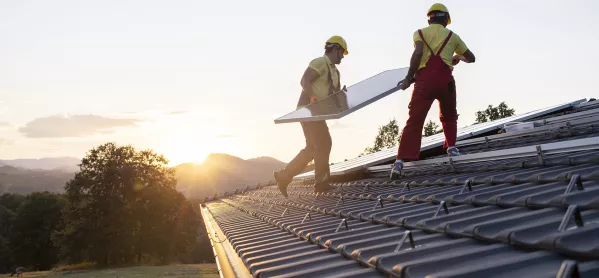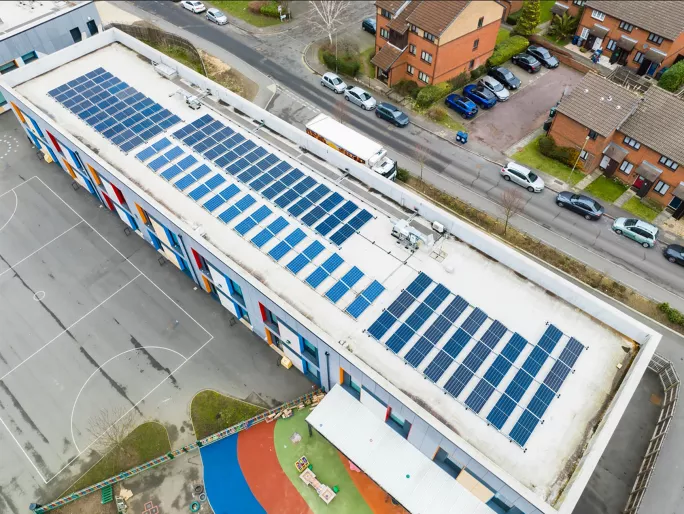- Home
- Leadership
- Finance
- How solar panels will save our trust £1.5m
How solar panels will save our trust £1.5m

For schools and trusts, rocketing energy bills have been a major issue over the past year.
While government support on energy costs has helped, such as the Energy Bill Relief Scheme and the (notably scaled back) Energy Bills Discount Scheme, it has also made it clear that anything that can cut energy use or embrace more renewable forms of energy should be considered.
This is especially true for multi-academy trusts, where major economies-of-scale savings can be realised, both in reducing the use of fossil fuels and saving vital funds that can be better spent elsewhere.
At the Bellevue Place Education Trust (BPET), formed of 10 primary schools across London and Berkshire, educating 3,300 pupils, we have been busy working to do just this.
First we turned to a digital energy services provider called eEnergy to explore energy efficiencies in lighting - chiefly by switching all our schools to LED lightbulbs. This helped to cut our carbon use by 50 per cent in the first year alone and helped to reduce bills.
The bigger project, though, has been a move to install solar panels across our schools - a move that began with the “lightbulb” moment when we realised that 75 per cent of our schools’ energy use is during daylight hours.

We moved quickly to install panels on nine out of our 10 schools (one school’s roof is inaccessible), as we could drastically cut our energy bills and start saving significant amounts - indeed, savings from three sites alone are expected to be £37,340 over 10 years and £409,801 across the next 25 years.
The projected cumulative net saving in energy costs across the nine schools over 25 years is £1,462,000. This will also drastically reduce our carbon emissions by 1,675 tons over the next 25 years - 67 tons per year - helping with our environmental commitments as a trust.
Installing solar panels on school sites
Of course, installing solar panels was not a quick or simple job and it comes with some major considerations, not least the cost.
However, working with eEnergy, we were able to achieve this because it provided the upfront capital for the installation, which is offset through a subscription model, where we repay the costs of the solar panels over the next seven years, funded by the savings in energy costs.
Furthermore, since making the commitment, we have been able to allocate the recent Department for Education energy efficiency grant, through which we received £164,000 as a trust.
- Climate change: The school teaching the sector to go fossil fuel-free
- Energy bills: Why we hired a drone to tackle sky-high energy costs
- School budgets: School energy bills “will stay high” with reduced support
We also didn’t need to tender as we went through the Everything FM framework, a compliance procurement framework that avoids the need for a procurement process, to help efficiency in the contract awarding process.
Equally, we didn’t simply hand everything over to outside firms, as our director of operations led on the project, with constant meetings to ensure everything was on track and delivering as promised. For the installations themselves, we were able to install all the panels during the summer holidays in around three to four weeks, which meant no disruption during term time for pupils or staff.
Reinvesting savings
Although it’s early days in the lifespan of the installation - we still haven’t had a full summer to really see how much energy the solar panels can generate - we are seeing the benefits immediately in terms of the electricity being generated, which powers our lighting, drastically reducing energy bills.
What’s more, this has freed up capital that has been used to enable school trips, keep residentials going, facilitate competitions like our recent trust-wide girls’ football tournament and continue to deliver experiences for learners that complement the curriculum.
We expect power generation to increase as summer arrives, and we yield even more return on the investment, including generating revenue by selling excess energy back to the National Grid.
Last but not least, by doing this we have been able to show our pupils how we, as a trust, are actively working to reduce our impact on the environment and climate change as part of our commitment to the Let’s Go Zero 2030 campaign.
The energy crisis has been a nasty shock for everyone in education - and, indeed, all industries - and should serve as a wake-up call that efforts to move to more renewable energy sources should begin in earnest if they have not already.
Mark Greatrex is the CEO of the Bellevue Place Education Trust
You need a Tes subscription to read this article
Subscribe now to read this article and get other subscriber-only content:
- Unlimited access to all Tes magazine content
- Exclusive subscriber-only stories
- Award-winning email newsletters
Already a subscriber? Log in
You need a subscription to read this article
Subscribe now to read this article and get other subscriber-only content, including:
- Unlimited access to all Tes magazine content
- Exclusive subscriber-only stories
- Award-winning email newsletters



